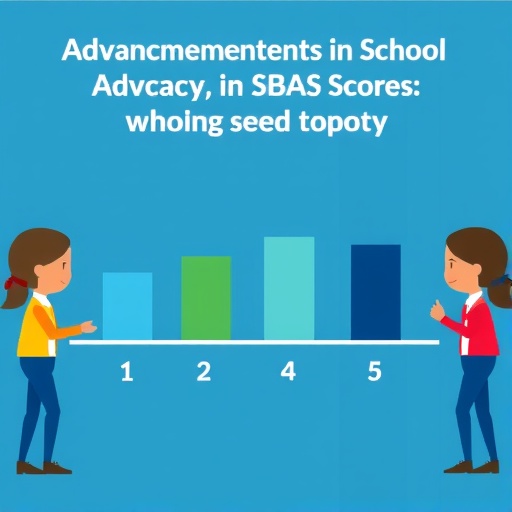In a groundbreaking study that has the potential to reshape school mental health initiatives, researchers Knox and Kalkbrenner have developed and validated a novel instrument known as the School-Based Advocacy and Awareness Scale (SBAAS). This scale promises to enhance the way educators, policymakers, and mental health professionals approach advocacy in school settings. The validation of this tool is critical as it seeks to provide empirical support for mental health initiatives that underline the importance of mental well-being among students.
The SBAAS is designed to measure awareness and advocacy behaviors among school personnel regarding mental health issues. In understanding the urgency of mental health considerations within the educational landscape, Knox and Kalkbrenner’s research taps into a pressing need for effective frameworks that can be utilized across diverse school settings. Their approach is not just theoretical; it embodies a practical solution that can manifest in schools, making mental health awareness a priority among educational stakeholders.
With the increasing acknowledgment of mental health challenges affecting students, it is essential to equip school staff with the means to advocate effectively for these issues. The SBAAS allows schools to quantitatively assess the level of advocacy and awareness present within their communities. The crucial marriage of theory with practice within this scale introduces a systematic method for measuring success and areas necessitating improvement in mental health advocacy.
The research team undertook a meticulous process to develop the SBAAS, employing rigorous psychometric methods to ensure its reliability and validity. Such validation is critical in solidifying its role as a credible tool that educators can utilize when advocating for mental health initiatives. By ensuring that the SBAAS can deliver consistent and accurate results, Knox and Kalkbrenner provide a vital resource that lends credibility to mental health advocacy operations in schools.
One of the standout features of the SBAAS is its versatility; it can be easily adapted to fit various educational contexts. This adaptability is particularly important considering the diverse environments within which schools operate. Whether in urban, suburban, or rural settings, the SBAAS is designed to reflect the unique challenges and resources available to each school, fostering a more comprehensive understanding of advocacy needs in mental health contexts.
In this climate of increasing awareness around mental health, the timing of the SBAAS development could not be more prescient. With mounting evidence linking mental health struggles to academic performance and overall student well-being, the tools that facilitate necessary advocacy can play a pivotal role. The SBAAS not only aims to identify gaps in awareness but also establishes a baseline from which schools can operate to promote better mental health outcomes.
Furthermore, the scale encourages an inclusive approach by emphasizing the need for collaboration among teachers, administrators, and mental health professionals. Effective advocacy does not stem from isolated efforts; it requires a collective mindset that incorporates a wide array of perspectives within the educational community. The SBAAS fosters such collaboration, driving home the importance of communication and shared goals in mental health advocacy.
As schools look to drive change and implement robust mental health programs, the SBAAS offers data-driven insights that can direct their efforts. The ability to quantify advocacy and awareness through the scale allows for targeted interventions that can significantly impact student wellness. Schools will be better equipped to allocate resources and develop initiatives that uphold the mental health of all students, ensuring a more supportive and conducive learning environment.
The implications of the SBAAS go beyond the immediate school setting. As an innovative tool, it has the potential to influence broader education policies regarding mental health. Policymakers, armed with data derived from the SBAAS, can make informed decisions that advocate for necessary funding and resources aimed at enhancing mental health support systems within schools. This way, schools can transform into models of mental health awareness and responsiveness.
Moreover, the study underscores the importance of continuously refining and enhancing advocacy tools like the SBAAS as societal perceptions of mental health evolve. Ongoing research and feedback mechanisms can facilitate adaptations in the scale, maintaining its relevance and effectiveness in addressing the ever-changing landscape of school mental health. The dialogue concerning mental health advocacy and awareness must be sustained and invigorated to support the dynamic needs of students.
As schools grapple with integrating mental health into their core mission, the SBAAS stands as a beacon of hope and a practical guide. The framework it offers will help schools not only recognize the critical importance of mental health advocacy but also measure their efforts towards this end, thereby ensuring that students receive the support they truly need.
In conclusion, Knox and Kalkbrenner’s development of the SBAAS represents a significant advancement in school mental health advocacy. This research provides the evidence-based foundation necessary for schools to elevate their approach toward mental health awareness and advocacy. The SBAAS will undoubtedly contribute to a transition toward a more mindful and attentive educational framework that prioritizes students’ mental well-being, making a lasting impact for generations to come.
Subject of Research: Development and validation of the School-Based Advocacy and Awareness Scale (SBAAS)
Article Title: Development and Validation of Scores on the School-Based Advocacy and Awareness Scale (SBAAS)
Article References:
Knox, K.M., Kalkbrenner, M.T. Development and Validation of Scores on the School-Based Advocacy and Awareness Scale (SBAAS). School Mental Health (2025). https://doi.org/10.1007/s12310-025-09823-5
Image Credits: AI Generated
DOI: https://doi.org/10.1007/s12310-025-09823-5
Keywords: School-Based Advocacy, Mental Health Awareness, SBAAS, Educational Research, School Mental Health.




